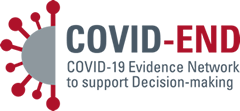Principles
Seven principles underpin COVID-END’s work:
- supporting (not competing with or replacing) well-positioned regional, national and sub-national organizations that are working in close partnership with key target audiences and already responding to their evidence needs
- supporting – with a common brand/identity, small agile secretariat, and simple working group structure – a distributed network of organizations and individuals to play to their comparative advantages and leverage one another’s work
- seeking out quick wins for those supporting decision-makers and among those involved in preparing evidence syntheses, technology assessments and guidelines, and taking measured steps to longer-term solutions that can better support decision-makers
- strengthening existing institutions (e.g., Campbell and Cochrane) and processes (e.g., protocol registration in PROSPERO) and contributing to their long-term sustainability
- addressing a diversity of regional and linguistic needs among decision-makers and those who support them
- ensuring diversity, equity and inclusion in the leadership of the initiative and its working groups (e.g., achieving a balance of co-chairs by gender and from high-income countries and from low- and middle-income countries)
- committing to related principles articulated by others
- principles of high quality evidence synthesis as articled by Evidence Synthesis International
- principles of open access to of all data, methods, processes, code, software, publications, education and peer review produced through the initiative (in keeping with ‘open synthesis’ principles
